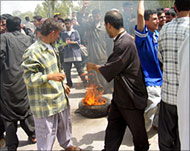Occupation personnel killed in Iraq
At least seven occupation soldiers have been killed in separate incidents in Iraq.

In one incident, soldiers hit an explosive device while driving in a vehicle in the province of al-Anbar, a US military official told Aljazeera on Wednesday.
Army officials refused to reveal the nationalities of those killed but the area is occupied by US forces.
Near the restive town of Ramadi, west of Baghdad, at least two US soldiers were killed and three others were injured when their Humvee hit an explosive device, eyewitnesses told our correspondent.
In a separate incident also west of Baghdad, four foreigners were killed when their vehicles came under attack, setting them on fire, reported Aljazeera.
One witness said fighters opened fire on the vehicles in Falluja.
Television pictures showed one incinerated body being kicked and stamped on by a member of the jubilant crowd, while others dragged a blackened body down the road by its feet.
At least two bodies were tied to cars and pulled through the streets, witnesses said. US officials later confirmed that three of the four were American citizens.
Afterward, journalists reported seeing two bodies, one of them headless, hanging by their feet from a bridge over the Euphrates River as locals stoned them.
In the southern city of Basra, three British occupation soldiers were injured when an explosive device detonated near their vehicle, reported London’s defence ministry.
More car bombs
The governor of Diyala province survived an assassination attempt when a bomber blew up his car moments after the governor had passed through a neighbourhood, reported our correspondent.
Twelve people, including four policemen and eight civilians, were injured.
Tensions have been high during the past 24 hours.
Late on Tuesday, occupation officials confirmed another soldier was killed in a roadside bomb in Ramadi. A second soldier was injured.
Military authorities refused to reveal their nationalities but Ramadi is occupied by US forces.
Growing frustrations
In the city of Najaf yesterday, five people were hurt in clashes between unemployed Iraqi demonstrators and Spanish troops and police.
 |
|
Unemployed Iraqis are struggling |
Two policemen, a Spanish soldier and two protesters were injured when hundreds of Iraqis pelted the governor’s office and police cars with stones, said a local Iraqi police chief.
Police detained around 30 demonstrators carrying Kalashnikov assault rifles.
Some 1300 Spanish troops are deployed in central Iraq, but incoming Prime Minister Jose Luis Rodriguez Zapatero has pledged to pull them out by 30 June, unless a UN-mandated force is in place by then.
Najaf and several southern cities have already witnessed demonstrations by the unemployed, amid an estimated unemployment rate of at least 50% nationwide. But the US-appointed Iraqi Governing Council (IGC) says unemployment is around 30%.
‘WMD’ search
As the toll among occupation soldiers rises, the new head of the Iraq Survey Group told the US Senate’s armed services committee he would change the direction of efforts to uncover Iraq’s alleged chemical, biological and nuclear weapons.
Washington offered Iraq’s alleged possession of illegal arms as one of the main justifications to launch war against Baghdad. But since the US-led invasion last March, no such weapons have been found.
The US chief weapons inspector Charles Duelfer said on Tuesday his team would be looking instead at whether the ousted Iraqi President Saddam Hussein intended to develop WMDs.
“Ultimately what we want is a comprehensive picture, not just simply answering questions – were there weapons, were there not weapons?” Duelfer told reporters after briefing the Senate armed services committee behind closed doors.
The new quest to determine whether Saddam intended to develop weapons of mass destruction reflects the Bush administration’s desperation to justify a war that has come under increasing criticism.